TOEFL Online 赵东坡托福听力方法课讲义 2
新东方TOEFL复习笔记(第一部分:听力)2
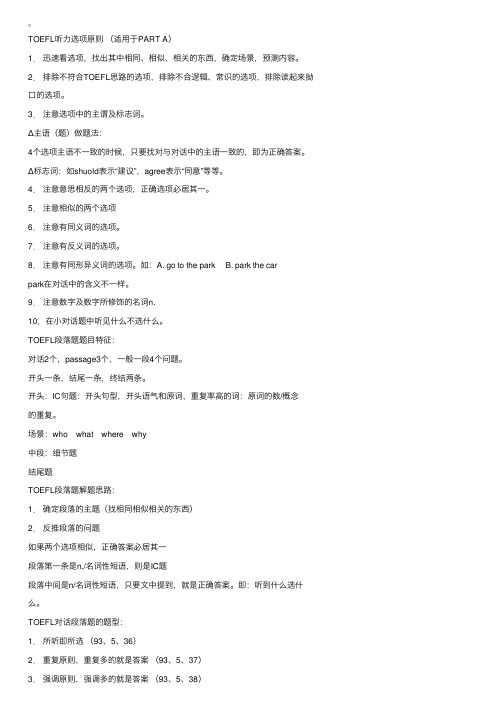
TOEFL听⼒选项原则(适⽤于PART A)1.迅速看选项,找出其中相同、相似、相关的东西,确定场景,预测内容。
2.排除不符合TOEFL思路的选项,排除不合逻辑、常识的选项,排除读起来拗⼝的选项。
3.注意选项中的主谓及标志词。
Δ主语(题)做题法:4个选项主语不⼀致的时候,只要找对与对话中的主语⼀致的,即为正确答案。
Δ标志词:如shuold表⽰“建议”,agree表⽰“同意”等等。
4.注意意思相反的两个选项,正确选项必居其⼀。
5.注意相似的两个选项6.注意有同义词的选项。
7.注意有反义词的选项。
8.注意有同形异义词的选项。
如:A. go to the park B. park the car park在对话中的含义不⼀样。
9.注意数字及数字所修饰的名词n.10.在⼩对话题中听见什么不选什么。
TOEFL段落题题⽬特征:对话2个,passage3个,⼀般⼀段4个问题。
开头⼀条,结尾⼀条,终结两条。
开头:IC句题:开头句型,开头语⽓和原词,重复率⾼的词:原词的数/概念的重复。
场景:who what where why中段:细节题结尾题TOEFL段落题解题思路:1.确定段落的主题(找相同相似相关的东西)2.反推段落的问题如果两个选项相似,正确答案必居其⼀段落第⼀条是n./名词性短语,则是IC题段落中间是n/名词性短语,只要⽂中提到,就是正确答案。
即:听到什么选什么。
TOEFL对话段落题的题型:1.所听即所选(93、5、36)2.重复原则,重复多的就是答案(93、5、37)3.强调原则,强调多的就是答案(93、5、38)4.建议原则,有建议的就是考点。
5.对话题结构特点:开头:打招呼后,信息作为开头。
结尾:最后⼀句。
TOEFL错题原因:慢热(听时不看) Part A⾛神(延长时间)连错(学会放弃)读题(先紧后松)⽼题重要题型:中间带but转折题:1.语⽓转折: 90.1.33/96.12.A142.表单词多种含义 89.8.24/96.10.A2对⼀般疑问句的回答:1.听清第⼆句开头的短结构 89、8、322.间接回答⼀定表⽰反对 96、10、A123.听不懂没关系(第⼆句长⽽绕),选⼀个否定答案就可以 96、8、30 4.第⼀句语调特征:最后为升调5.第⼆句习语。
托福听力技巧分析PPT课件

TPO 15 Lecture 1 psychology
6. What is the lecture mainly about? A. Methods people used to eliminate
distractions. (irrelevant) B. The area of the brain responsible for
cafeteria (irrelevant)
2021
DETAIL QUESTION 细节题
什么是细节题?(what?) require the listener to understand and remember
explicit details or facts that are important as an explanation or an example of the main idea. These details are typically related, directly or indirectly, to the gist of the text, by providing elaboration, examples or other support.
2021
Conversation 场景分类
2021
Lecture 具体分类
2021
2021
新托福考试题型
IBT listening comprehension
Basic comprehension
Pragmatic understanding
Connecting information
Gist question Detail question Purpose question Attitude question Organization question Inference question
托福听力第二次课
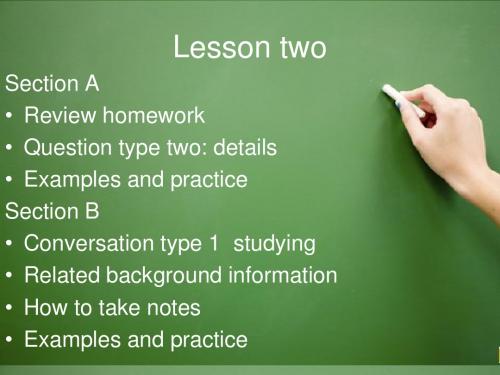
记笔记
。
记解决办法和具体建议 Ep: What is the problem with the student’s paper? What reasons does the student give? What suggestions does the professor give? 通常选择两到三个答案
例题解析 Listen to details
• • • Questions1 Why does the man have to pay a fine?
Key sentence: The parking spots in front of the library are reserved for students who live-off campus (关键词) 根据关键词对应选项D
听原因
• 听原因细节时, 要注意什么是因,什么是果 • 表示前因后果:So / therefore、 consequently、as a consequence、for this purpose 、result in、lead to • 表示前果后因:Result from、originate from、spring from, arise out of、it lies/is in (that)
例题解析 Listen to details
• • Questions2 Why didn’t the student get the notice about the bill?
Key sentence: E: We sent four or five notices to your email. S: Oh! I haven’t been checking my email. I’ve been so busy with midterms.
Toefl-2Listening
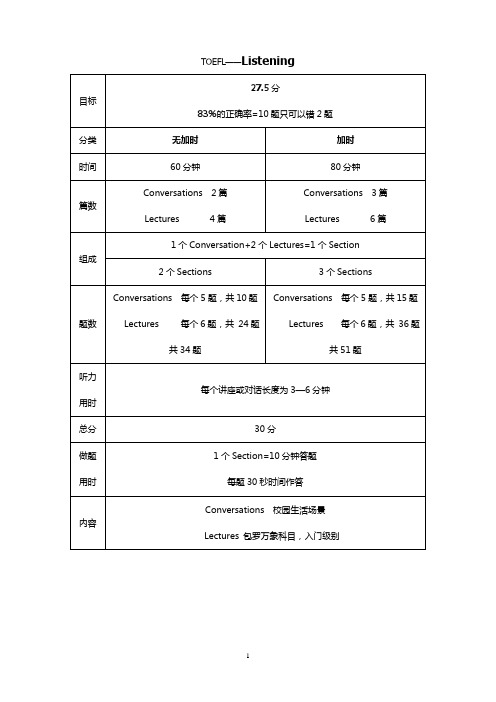
TOEFL——Listening目标27.5分83%的正确率=10题只可以错2题分类无加时加时时间60分钟80分钟篇数Conversations 2篇Lectures 4篇Conversations 3篇Lectures 6篇组成1个Conversation+2个Lectures=1个Section2个Sections 3个Sections题数Conversations 每个5题,共10题Lectures 每个6题,共24题共34题Conversations 每个5题,共15题Lectures 每个6题,共36题共51题听力用时每个讲座或对话长度为3—6分钟总分30分做题用时1个Section=10分钟答题每题30秒时间作答内容Conversations 校园生活场景Lectures 包罗万象科目,入门级别·答题策略:1、细听文章:每篇文章只听一次2、图片帮助理解:开头图片显示对话所处情景(如教室或学校办公室)和讲话的人其他图片(更换时会哔声提示)有助于理解段落内容3、边听边记笔记※笔记要点:1.洞悉要点出现规律2.简化笔记,减轻压力,着重理解(1)围绕一个中心话题发散的思路:使用速记符号因果∵∴举例eg:对比=、≈、≠、>、<、vs 分类①②③时间↑↓问答Q: A:建议sug:、→(2)其他内容:①常用熟悉的内容:可用中文写②关键而不熟悉的内容:写前两个音节③前文出现过的内容:箭头标示不重复④文中强调的内容:△、☆4、浏览问题,判断问题类型5、仔细考虑每个问题,选择问题最佳答案:只有一次回答机会,不可返回修改6、注意答题时间,所有题目都要答完Conversations:·对话发生的两个场景1、办公室:可能涉及学术内容或与课程要求有关。
2、学生服务:一般发生在大学校园中,常为非学术性内容·基本结构:P=problem C=cause S=suggestion/solution A=attitude·Basic Vocab:1、学习thesis学位论文、essay一般议论文、dissertation英式论文、paper论文、assignment作业、lab report实验报告、research report调查报告、grade成绩、presentation陈述、grading system评分体制、seminar研讨会、quiz测试、exam考试2、选课credit学分、major专业、minor辅修专业、required course必修课、intermediate course、elective/optional course选修课、prerequisite course预修课程、take选、drop弃选retake重选、introductory course基础入门课、advanced course高级课程3、论文term paper学期报告、topic、abstract摘要、introduction介绍、literature review文献综述、body正文、conclusion结语、bibliography/reference参考文献outline大纲、format格式、preliminary research前导性研究、research data、statistics、draft草稿、analyze/analysis、rewrite、revise修订、due到期的、submit/hand in提交4、图书馆publication出版簿、academic journal学术报刊、periodical期刊、back issue过期报刊、current issue近期杂志、book catalogue图书目录、title index索引、alphabetical index字母索引、call number编目号码、reserved books馆藏书、on reserve预留制度、borrowing privileges优先借书、reference room阅览室、facilities设施、circulation借书柜台、electronic sources电子设备资源、library database、reference参考书、check out借出、overdue过期的、overdue fine过期罚金、suspend禁用、renew续借5、学校tuition、register/registration、registrar注册主任、enroll、student’s union学生会、council、association学生会、board董事会、president校长、dean院长、faculty教职工、staff/personnel 人员、bulletin公告栏、fellowship(研究成果奖学金)、financial aid助学金、transfer转学Lectures:·对话发生的场景:老师课堂授课·话题类型:1、Arts艺术:Architecture建筑、Industrial design/art工业设计/艺术、City planning城市规划Crafts手工艺(weaving纺织,knitting编织,fabrics织物,furniture家具,carving雕刻、mosaics镶嵌工艺品,ceramics陶瓷工艺,folk and tribal art民间艺术和部落艺术)Cave/rock art岩洞/石壁艺术、Music and music history音乐和音乐史、Photography摄影、Literature and authors文学和作家Books书籍,newspapers报纸,magazines杂志,journals期刊2、Life Science生命科学Extinction of or conservation efforts for animals and plants动植物的灭绝或保护Fish and other aquatic organisms鱼类和其他水生生物Bacteria and other one-called organisms细菌和其他单细胞生物Viruses病毒、Medical techniques医疗技术、Public health公共卫生、Physiology of sensory organs感觉器官的生理机能、Biochemistry生物化学、Animal behavior动物行为(migration迁徙,food foraging觅食,defenses防御行为)Habitats and the adaptation of animals and plants to them动植物的栖息地以及动植物对栖息地的适应Nutrition and its impact on the body营养及其对机体的影响Animal communication动物交流3、Physical Science自然科学Weather and atmosphere天气和大气、Oceanography海洋学、Glaciers冰川,glacial landforms冰川地形,ice ages冰河纪、Deserts and other extreme environments沙漠和其他极端环境Pollution污染,alternative energy替代能源,environmental policy环境政策Other planets’ atmospheres其他星球的环境Astronomy and cosmology天文学和宇宙学、Properties of light,optics光的特性、光学、Properties of sound声的特性、Electromagnetic radiation电磁辐射、Particle physics粒子物理学、Technology of TV,radio,radar电视、广播和雷达技术Seismology(plate structure,earthquakes,tectonics,continental drift,structure of volcanoes) 地震学:板块结构、地震、构造地质学、大陆漂移、火山结构4、Social Science社会科学Anthropology of nonindustrialized civilizations非工业化文明社会的人类学Early writing systems早期文字系统、Historical linguistics历史语言学Business商业,management管理,marketing市场,accounting会计TV/radio as mass communication作为大众传媒的电视/电台Child development儿童发展、Education教育Social behavior of groups,community dynamics,communal behavior群体的社会行为、群落动态、集群行为Modern history (including the history of urbanization and industrialization and their economic and social effects)现代历史,包括城市化和工业化的历史及其带来的经济和社会影响·考查:与细节相关联的点,题目基于各个段落·要点:理清段落结构;划分段落;筛选关键信息·Basic structure:Term术语Definition定义/Characteristic特征Example例子Option见解在Lecture中1、注意材料中professor提到的新词或新概念,通常会写在黑板上2、注意整个讲座的组织结构以及讲座内容是如何衔接的·题型概要:1、基本理解:主旨、细节2、实际理解:目的、态度3、信息连结:组织结构、推断题型1——内容主旨题·考查:理解主旨大意,总体内容·题目类型:1、What problem does the man have?2、What are the speakers mainly discussing?3、What is the main topic of the lecture?·方法:1、要对听到的信息进行归纳总结2、排除只涉及局部听力材料的选项3、利用笔记:确定于笔记细节最为贴切的主题,选择与主题最接近选项题型2——目的主旨题·考查:对话或讲座的目的·题目类型:1、Why does the student visit the professor?2、Why does the student visit the registrar’s office?3、Why did the professor ask to see the student?4、Why does the professor explain X?·方法:1、此类问题较有可能出现在对话中,偶尔会出现在讲座中、2、情景:学生去办公室找教授;教授邀请学生来办公室讨论作业情况等3、利用笔记:在笔记中找寻信息以明确最初目的是什么4、对话的目的并不总是跟对话的主要内容相关5、学生服务对话情景:学生经常试图解决一个问题。
新托福听力课讲义

新托福听力基础班讲义新托福及听力的基本情况托福基础听力的主要内容:⏹新托福听力的基本情况⏹美语语音⏹托福特色场景词汇扩展⏹托福听力基本应试技巧⏹北美校园生活透视新托听力基本形式⏹新答题方式:隔间+电脑+耳机+笔记⏹ 2.答题程序:听读选不可跳跃旧托福:先读,后听,再选。
新托:1.耳机中出现所问题声音,画面上出现题干和相关场景图片。
2.听完整篇文章之前无法预读任何问题或选项。
只得先听,后读,再选。
考题依然延续机考托福的规则,不可看,不可逆,不可改。
⏹ 3.考察题型增多:单选多选图表是非排序⏹ 4.语音形式:美音为主流+国际口音⏹新托福基础听力基本范围北美大学真实课堂,教室内外的各种交流包括对话和讲座两种类型。
⏹共6篇,做题时间60-90分钟。
每篇在600字左右,时间为3-5分钟。
(注:托福基础课的任务之一即适应托福段子的长度)instructors’ office hours⏹对话人物:教授与学生;⏹对话地点:教师办公室;⏹对话内容可为学术讨论或有关询问课程等问题。
对话(2)service encounters 后勤服务⏹对话人物:学生与工作人员;⏹对话地点:校园某办公室;⏹对话内容:非学术的询问。
对话(3) student interactions⏹对话人物:学生甲乙;⏹对话地点:教室以外相遇;⏹对话内容:学术讨论;非学术讨论托福听力考试基本内容之讲座LECTURE内容:天文、地理、生物、历史等等也都是托福惯用的测试内容。
形式:有的是教授”独白“有的是教授演讲中夹杂学生提问、教授提问。
新托福听力新特点l.整个铲除了容易丢分的笔试小对话,没有过的的俚语俗语.举例:You bet. I am out of here.2. 允许考生记笔记。
因祸得福,既然要记笔记,语速自然放慢;特别是重听题,大概有2-3题,通常问Listen again and then answer the question “why does the professor say this?”4.新托福关键的难词和术语显示在屏幕上,使考生心里踏实不少。
托福听力全解 ppt课件

2021/2/5
14
Lecture
2021/2/5
15
1. Basic Comprehension 基本理解力 1). Gist 2). Detail
2021/2/5
16
2. Pragmatic Understanding 实际理解力 1). Function 2). Attitude
2021/2/5
ocean
oceanic
declare declaration
2021/2/5
20
3. 语音现象
连读:辅音+元音
get up
check out
run out of all about it
in-side out put it off
2021/2/5
21
失爆:/ b / / p / / d / / t / / g / / k / + 与其不相 同的辅音,发后一个辅音,前一个做发音准 备
blackboard breakfast
stop by sit down
lap top
mid-term
2021/2/5
22
弱读:元音音素的弱化,指一个单词中的元音音素 在口语中由于说话时语速快或在句子中处于次要位 置而不被强调等原因,不能发完全而标准的读音, 却变为强度较弱的其他元音的现象。
history /histəri/→/histri/ family /fæ mili/→/fæ mli/
2021/2/5
38
列举: first(ly), second, third, last/ finally one, another
2021/2/5
39
补充: and, as well as also, too, in addition further, furthermore
TOEFL Online 赵东坡托福听力方法课讲义 5
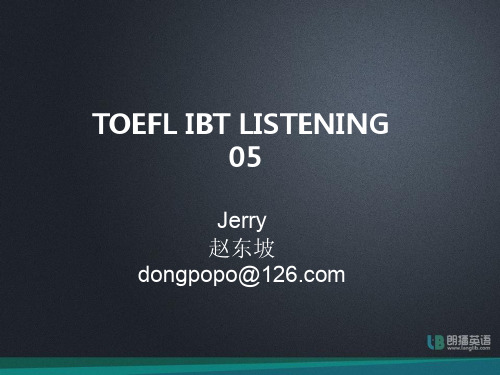
Basic Comprehension Questions 基本理解型题
• 1. Gist-Content—内容主旨题 • 2. Gist-Purpose—目的主旨题 • 3. Detail—细节题
1. Gist-Content—内容主旨题
• 明确主旨,主抓大意。讲座和对话都有。
• 材料中明确提出—lucky • 需要概括总结—实力体现
discuss? What is the lecture mainly about? What is the main topic of the lecture? What is the woman’s problem? What problem does the man have?
2. Gist-Purpose—目的主旨题
典型问法:说啥呢?
• • • • •
• • • •
What is the subject of the conversation ? What are the man and the woman discussing? What is the professor mainly discussing? What are the speakers mainly discussing? What aspect of …… does the instructor mainly
• 考查目的,多出现在对话题中
• 材料内容对目的判断的干扰性大,要主抓真实目的,不 要被迷惑
• 围绕解决问题出现的,一定要抓住问题及其解决方案
典型问法:为什么呢?
• • • • • • • • • Why Why Why Why Why Why Why Why Why did the man/woman go to see the professor? did the professor ask to see the student? does the student visit the professor? does the student visit the registrar’s office? does the professor explain ……? does the student say ……? does the student mention ……? does the professor talk about ……? does the instructor ask the class about ……?
TOEFL IBT LISTENING pronunciation

失去爆破
• 失去爆破:顾名思义,指爆破音失去爆破。发生的条件如 失去爆破: 下:当前面的单词以[p][b][t][d][k][g]这六个爆破音中的任 何一个结尾,而紧随其后的单词是以辅音开头的,这时前 面单词中的爆破音失去爆破。读法是在发爆破音时只阻塞 气流却不将之释放,说白了就是只作口型不发音。 lap dog mad John pet lion truck stop big shoes hot day a suitcase sit down put it down red chair round table good teacher black gate cheap box a bad cold good tea bad boy work hard look good a blackboard a handbag bad news just great could be
动词加ed
• 一般来说,规则动词的过去式是在动词原形后加ed, 以e结尾的动词后只加d;以y结尾的动词,y前是 元音字母时直接加ed,y前是辅音字母的动词把y 变成i 后再加ed。 • 发音时,清辅音后面读[t],浊辅音后面读[d];但 以[t]、[d]结尾的单词+ed时,读做[id]。 • 此外,元音后面一般都读[d]。 • look like enjoy collect suppress • scan applaud agree acquire bother chop connect demand dispute
Rising tone
• 如果短语或句子的核心重音(focus)落在最后一 个音节上, 该音节读升调,句子就是升调。 • Does Jerry like to play games? • 如果短语或句子的核心重音(focus)不在最后一 个音节上,则该核心重音所在音节的语调对句子 的语调趋势没有影响,但该音节可作为一个明显 的标志,位于它后面的所有音节都要读升调,句 子才是升调。 • Does Jerry like to play soccer? • Does Jerry like to play basketball?
托福听力2大高频热点题型出题思路指点
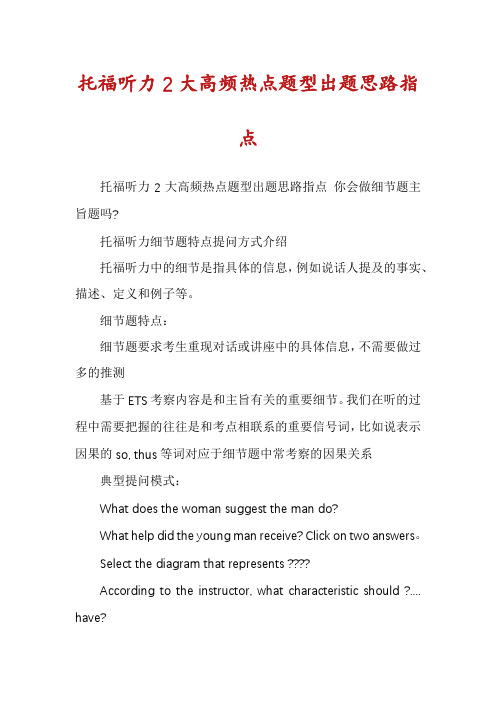
托福听力2大高频热点题型出题思路指点托福听力2大高频热点题型出题思路指点你会做细节题主旨题吗?托福听力细节题特点提问方式介绍托福听力中的细节是指具体的信息,例如说话人提及的事实、描述、定义和例子等。
细节题特点:细节题要求考生重现对话或讲座中的具体信息,不需要做过多的推测基于ETS考察内容是和主旨有关的重要细节。
我们在听的过程中需要把握的往往是和考点相联系的重要信号词,比如说表示因果的so, thus等词对应于细节题中常考察的因果关系典型提问模式:What does the woman suggest the man do?What help did the young man receive? Click on two answers。
Select the diagram that represents ????According to the instructor, what characteristic should ?.... have?How did the professor introduce ??.. ?According to the speaker, what does ??? mean?According to the prof essor, why is A superior to B?托福听力主旨题细节题特点提问方式介绍IBT听力主旨题考查把握谈话或演讲的主要内容的能力。
对于任何一个长段子,首先务必要把握的是文章的主旨和结构,只有主旨确定了,才有可能进一步去理解细节,做推断。
主旨题特点:通常是对一个谈话或演讲的主要内容的综合概括。
在一段长演讲中,通常会有两个或以上的主要表述内容,但这些内容往往是相互关联的,它们互相补充构成一个完整的主题。
典型提问形式:托福听力主旨题的问题常常以特殊疑问词开头,例如:What is the subject of the conversation?Why did the man go to see the professor?What are the man and the woman discussing?What is the woman’s problem?What is the lecture mainly about?What is the professor mainly discussing?What aspect of ?? does the instructor mainly discuss?托福备考之独立写作满分范文task:People attend college or university for many different reasons (for example, new experiences, career preparation, increased knowledge). Why do you think people attend college or university? Use specific reasons and examples to support your answer.托福备考之独立写作满分范文:Why People Attend College or University?There are many advantages to a college or university education. Students have ample opportunity to explore a variety of interests, increase both their general and specific knowledge, prepare for a chosen career and develop independence. All of these are valuable goals to achieve, but it is my belief that most students today pursue higher education insgroupsto prepare for their future careers.In the past, only the rich and privileged had the opportunity to attend a university and their goals were very different. Coming from wealthy families, few of them would have to compete for a job after graduation, and most wished only to be considered well-educated. Today’s students are more practical. They must be able to compete in a very competitive job market; therefore, a practical education is very important.Furthermore, higher education is a big investment and so most students want to get all they can out of it. For these students, it is better to have clearly defined career and education goals rather than to try and find themselves in college. Of course, all students want to increase their knowledge, but I believe that most students today want that knowledge to be relevant to their future careers.The world has changed a great deal since universities were established. They are still wonderful places for acquiring broad knowledge and for personal development. However, in today’s competitive world these pursuits must be balanced with the pursuit of more specific goals. That is why I think most students view higher education as a valuable tool in career preparation.托福备考之独立写作满分范文task:It is better for children to grow up in the countryside than in a big city. Do you agree or disagree? Use specific reasons and examples to develop your essay.托福备考之独立写作满分范文:Both the countryside and an urban environment have many things to offer. Many important museums and cultural venues can be found in the city. There is also often good access toeducational resources and a wide variety of job opportunities. However, the countryside offers a more relaxed and peaceful way of life. Communities are often close-knit and secure. Although both environments offer good opportunities for development, it is my opinion that life in the countryside is more beneficial for children.One important advantage of raising children in the countryside is that the environment is cleaner and healthier. With fresh air to breathe, less crowded living conditions, and more chances to take part in physical exercise, children in the country are usually healthier than those in the city. Another advantage of country living is safety. There is not only less crime in the countryside, but also fewer traffic accidents. Parents do not need to worry so much when their children are playing outside. A third advantage is the stronger sense of community in the country. Children know their neighbors and learn to care about others at an early age. Finally, a country upbringing allows children to experience a more natural environment without all the distractions of entertainment places in the city. Thus, they can concentrate on their schoolwork and their families.Due to the great number of advantages in raising children inthe country, I believe it is better for children to grow up there rather than in a city. Without all the dangers and distractions of city life, they will grow up healthier and better grounded in the moral values of their culture.托福备考之独立写作满分范文task:People attend college or university for many different reasons (for example, new experiences, career preparation, increased knowledge). Why do you think people attend college or university? Use specific reasons and examples to support your answer.托福备考之独立写作满分范文:People attend colleges or universities for a lot of different reasons. I believe that the three most common reasons are to prepare for a career, to have new experiences, and to increase their knowledge of themselves and the world around them.Career preparation is becoming more and more important to young people. For many, this is the primary reason to go to college, They know that the job market is competitive. At college, they can learn new skill for careers with a lot of opportunities. This means careers, such as information technology, that are expected to need a large workforce in the coming years.Also, students go to colleges and universities to have new experiences. This often means having the opportunity to meet people different from those in their hometowns. For most students, going to college is the first time they've been away from home by themselves. In additions, this is the first time they've had to make decisions on their own. Making these decisions increases their knowledge of themselves.Besides looking for self-knowledge, people also attend a university or college to expand their knowledge in subjects they find interesting. For many, this will be their last chance for a long time to learn about something that doesn't relate to their career.I would recommend that people not be so focused on a career. They should go to college to have new experiences and learn about themselves and the world they live in.。
赵东坡五步精听法:解决你托福听力差的问题
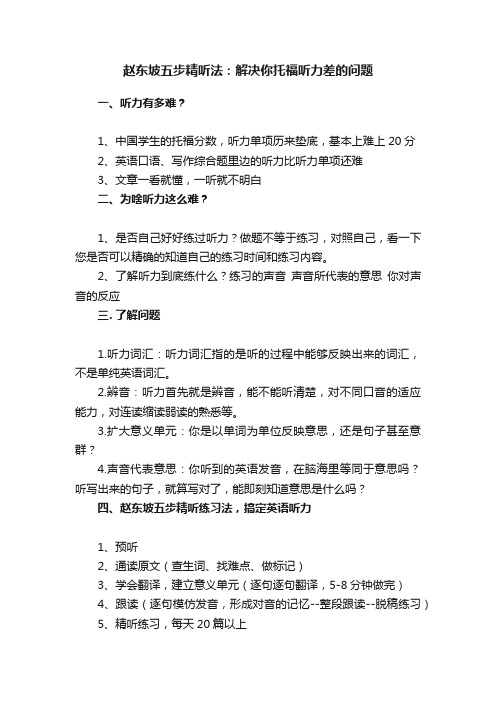
赵东坡五步精听法:解决你托福听力差的问题
一、听力有多难?
1、中国学生的托福分数,听力单项历来垫底,基本上难上20分
2、英语口语、写作综合题里边的听力比听力单项还难
3、文章一看就懂,一听就不明白
二、为啥听力这么难?
1、是否自己好好练过听力?做题不等于练习,对照自己,看一下您是否可以精确的知道自己的练习时间和练习内容。
2、了解听力到底练什么?练习的声音声音所代表的意思你对声音的反应
三. 了解问题
1.听力词汇:听力词汇指的是听的过程中能够反映出来的词汇,不是单纯英语词汇。
2.辨音:听力首先就是辨音,能不能听清楚,对不同口音的适应能力,对连读缩读弱读的熟悉等。
3.扩大意义单元:你是以单词为单位反映意思,还是句子甚至意群?
4.声音代表意思:你听到的英语发音,在脑海里等同于意思吗?听写出来的句子,就算写对了,能即刻知道意思是什么吗?
四、赵东坡五步精听练习法,搞定英语听力
1、预听
2、通读原文(查生词、找难点、做标记)
3、学会翻译,建立意义单元(逐句逐句翻译,5-8分钟做完)
4、跟读(逐句模仿发音,形成对音的记忆--整段跟读--脱稿练习)
5、精听练习,每天20篇以上。
托福听力讲义非常详细
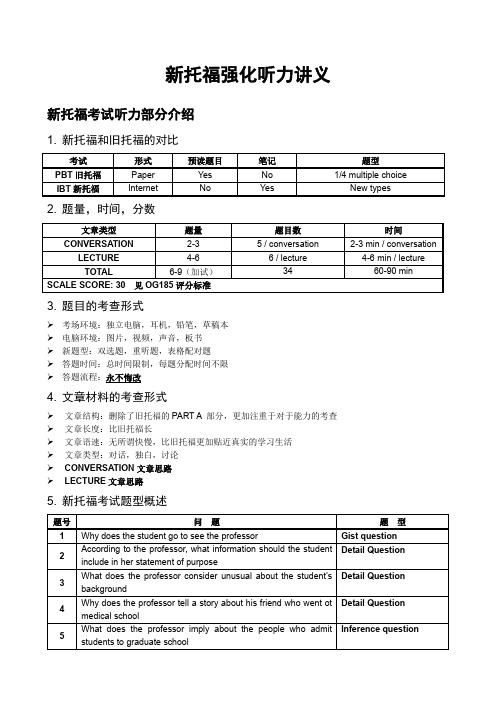
新托福强化听力讲义新托福考试听力部分介绍1. 新托福和旧托福的对比2. 题量,时间,分数3. 题目的考查形式考场环境:独立电脑,耳机,铅笔,草稿本电脑环境:图片,视频,声音,板书新题型:双选题,重听题,表格配对题答题时间:总时间限制,每题分配时间不限答题流程:永不悔改4. 文章材料的考查形式文章结构:删除了旧托福的PART A 部分,更加注重于对于能力的考查 文章长度:比旧托福长文章语速:无所谓快慢,比旧托福更加贴近真实的学习生活文章类型:对话,独白,讨论CONVERSATION文章思路LECTURE文章思路5. 新托福考试题型概述6. 界面展示7. IBT新托福资料说明——听力部分托福听力中的九大语音问题1. 语速问题托福听力过程中的语速问题如何解决语速问题2. 连读问题托福听力过程中的连读问题(1)关键性词语出现连读:否定形式●not at all:The meeting yesterday wasn’t at all boring.(2)常用性词语出现连读●for him连读中的基本规则(1)辅音+元音连读●I was found on the ground by the fountain about a field of a summer stride.●Not at all.●Rush hour.●This dictionary is not exactly what I wanted but it will do.●Travel agency, travel agent(2)辅音+辅音连读●Some money, bike key(3)元音+元音连读●Be on time●An apple a day keeps the doctor away(4)H连读●I lent him a book.●Larry is taking a lot of art, isn’t he●The stuff the nurse gave me seemed to have helped.●I must have left my keys at my sister’s house.●She learned to use the computer on her own.(5)其他特殊连读●【t】+【j】=【ch】:meet you, hurt you, that your●【d】+【j】=【dg】:would you, hand your, did you●【s】+【j】=【sh】:miss you, this year●【z】+【j】=【g】:as usual, because you●Example: won’t you, don’t you, didn’t you, haven’t you, hadn’t you, wouldn’t you,weren’t you, last year, next year, not yet, did you, had you, would you, I advice you, Iuse your, how’s your如何解决连读问题3. 失爆问题托福听力过程中的失爆问题:【p】,【b】,【t】,【d】,【k】,【g】任意两个连续出现就会发生失爆现象●Sit down, good night, friendly●-this calculator isn’t working right.-I think you’ve got the battery in upside down.如何解决失爆问题4. 略读问题托福听力过程中的略读问题:书写时将两个或多个相邻的单词省略某些字母而连接起来●I am = I’m, you have = you’ve, how is = how’s, that would = that’d●Doesn’t, didn’t, shouldn’t, hadn’t, hasn’t, wouldn’t, won’t●Official guide P199:OK. So we’ve talked about some different types of root systems of plants,and I’ve shown you some pretty cool slides, but now I want to talk about the extent of the rot system- the overall size of the root system…the depth.如何解决略读问题●I’m, you’re, she’s, they’re, there’s, he’s, who’s●We’ve, he’ll, she’d, she’ll, she’s, they’d, they’ve, they’ll●Can’t, weren’t, won’t, are n’t, wouldn’t, shouldn’t●Gotta, gonna5. 弱读问题托福听力过程中的弱读问题(1)介词弱化:●stay at home, do it for fun, come from China, go in the house, a cup of coffee, the train toParis(2)代词弱化:●Phone us when you are free.●I’ve lost my book.(3)连词弱化:●Please give me some cream and sugar.●Either Tom or Peter can come.如何解决弱读问题6. 英美音差异问题托福听力过程中的英美音问题(1)【r】音问题●Idea, really●They weren’t at the dorm last night.(A) They went to the dormitory.(B) They didn’t go to the dormitory.●-The snow is really coming down, isn’t it-Rarely do we have so much snow in December.-What does the man mean(A) it is typical December weather for this region.(B) such a large amount of snow is unusual for this month.(2)【o】【a:】●Glass, class, fast●Hot, box, rock(3)其他情况●Neither如何解决英美音问题●常见易混音:Course-cause, once more-one small, career-Korea, worse-was, bore-ball,door-doll, core-call, tear-tea, short-shot●不加儿化音的词:China, Australia, banana, wall●常见英美音不同读法:Neither, either, record, cupboard, cassette, garage, laboratory, adult,ordinary, secretary, dictionary7. 词性变音问题托福听力过程中的词性变音问题●Method- methodically●校园词汇的变音:meteorology, economics, geography如何解决词性变音问题8. Company-companion, library-librarian, geography-geographical, ignore-ignorant,photo-photographer-photographic, declare-declaration, economy-economic-economical, invite-invitation, technology-technological, type-typical缩写问题托福听力过程中的缩写问题●Sitcom●Chem lab●prof如何解决词性缩写问题●Intro. Course = introductory course 导论性课Demo = demonstration 演示●Memo = memorandum 备忘录Info. = Information 信息●Expo = exposition 博览会Chem.= chemistry 化学●Comm. = commerce 商业Tech = technology 技术●Ad.= advertisement 广告Dorm = dormitory 寝室●M.A. = Master of Arts 文学硕士M.S. = Master of Science 理学硕士● B.A. =Bachelor of Arts文学士 B.S. = Bachelor of Science理学士●alga = algebra 代数学、代数anat = anatomy 解剖学、解剖●archit = architecture 建筑学、建筑arith = arithmetic 算术、算术●astron = astronomy 天文学、天文eng = engineering工程学、工程●electr = electricity电学、电fin = finance财政学、财政●geol = geology地质学、地质geom = geometry几何学、几何●gram = grammar文法hist = history历史、史●ling = linguistics语言学、语言maths = mathematics数学、数学●mech = mechanics 机械学、机械med = medical医学、医●met = meteorology气象学、气象myth = mythology 神话●phil = philosophy哲学phon = phonetics 语言学、语言●photo = photography摄影术、摄影phys = physics物理学、物理●physiol = physiology生理学、生理pol = politics政治学、政治●psych = psychology心理学、心理9. 数字问题托福听力过程中的数字问题●逗号原则1,234,567,890:新托福听力记笔记NOTE TAKING记笔记的两种形式符号●>: surpass, exceed●<:less than●=: equal to, the same as●≠: difference●↑: increase, promote, enhance, improve●↓: decrease, fall, worsen●+: plus, add, besides, moreover●-: minus, deduct, except●→: result in, lead to●←: originate from, date back to●√: correct, good, positive, affirmative●×: wrong, bad, mistaken, negative●☆: outstanding, elite●∵: because, owing to, thanks to, since, as●∴: therefore, consequently, as a result, so, hence●∑: total, amount●γ: government缩写●able?BL: PRBL,RSBL,DBL●ing?G: SHPG●tion?N: OPTN,NAN●ment?T: AGRMT●ize?Z: RCGNZ,OGNZ●tive?TV: EFCTV,●ful?FL: SCFL●less?LS: RGDLS●ent/ant?T: URGT●al/ial?L: ARVL练习Sample Script:American universities have been offering classes online through computers for a number of years.Now, some newly created colleges are offering academic degrees online. One university offers both bach elor’s degrees and master’s degrees. Official say they try to provide students with a social experience as well as an educational one. For example, in some programs, groups of the same six students progress through all their classes together. They communicate by computer. Another online school uses a problem-solving method of teaching. Students attempt to solve real problems in their classes online instead of reading information.Students who have taken online classes say they like them because they do not have to travel to building at a set time to listen to a professor. Professors say they have better communication with students through e-mail notes than they do in many traditional classes.新托福听力文章套路1. 托福听力中的重点原则原则一:大写原则原则二:开头结尾原则:3T-2M原则原则三:重复原则原则四:转折对比原则原则五:强调原则原则六:比较原则原则七:建议原则原则八:举例原则原则九:现在原则原则十:解释原则原则十一:因果原则原则十二:观点态度原则原则十三:特殊问句原则2. 举例:OFFICIAL GUIDE PRACTICE SET 1——CONVERSATION3. 举例:OFFICIAL GUIDE PRACTICE SET 2——LECTURE1. 课程相关事务场景场景特点:主要涉及到一些和课程相关事项的解决方法。
TOEFL Online 谢侃托福写作方法课讲义 2

*失败的案列
•
⻅见!
话题引入入部分---没有抓住“核心心词”!
1. 托福独立写作—话题引入
*定义法:分析该核心词的含义或意义(好处) *核心词:体育、社会活动、学术课 *话题引入部分:Sports and social activities areห้องสมุดไป่ตู้ not only conducive to students’ physical quality, but also contribute a lot to their emotional quotient.
1. 托福独立写作—他人观点
2)这个现象引发了社会上的热议 *句型: a) Thus, an interesting discussion (heated debate) arises: + 稍作改变的题目 b) With this phenomenon comes an interesting discussion: +稍作改变的题目 c) This phenomenon(It) brings(triggers, arouses) an interesting discussion: +稍作改变的题目
1. 托福独立写作—开头段总论 *例题:同不同意:高官也应享受“隐私权”?请排序: 1. 最近高官频频落马让大家开始关注某一特殊群体的 “隐私权”----名人隐私权。 2. 作为公众的表率,高官应该牺牲掉一部分的隐私权。 3. 我的观点基于下述的理由和例子。 4. 隐私权是一个人最基本的权利之一。
1. 托福独立写作—话题引入
*失败的案列
1. 托福独立写作—他人观点
*3种“他人观点”表达方式: 1)有些人认为… 2)因此,社会上出现了一个有意思的讨论/热议的话 题:… *3)当涉及…,通常有…种方式
TOEFL SPEAKING预备课程2_英语考试_外语学习_教育专区
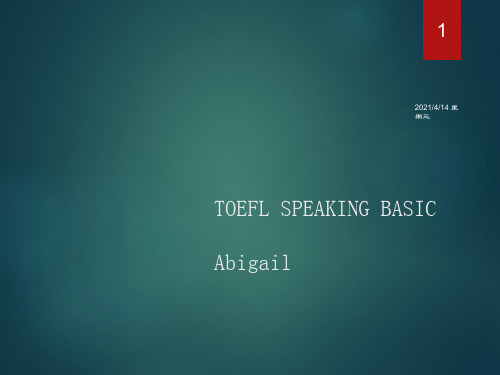
How to Express Your Passion 8 for sth
be fond of sth
2021/4/14 星
E.g. I've always been fond of chocolate.期三
have appetite for sth
E.g. It's still not clear whether the public will have an appetite for this new mechine.
Jimmy Kimmel Live!---ABC
23
2021/4/14 星 期三
The Daily Show with Jon Stewart
The Daily Show with Jon Stewart--Comedy Central Channel
24
2021/4/14 星 期三
The Late Late Show with 25
spouse
E.g. Do you have a family?
Late Night Talk Show
Late night talk show is specifically a kind of comedyoriented talk and variety show that airs late night.
Would you like / love (to do) sth / fancy...
I would not miss it, If I were you.
18
sibling ( lineal
2021/4/14 星 期三
descent/direct blood relatives)
托福听力讲义非常详细
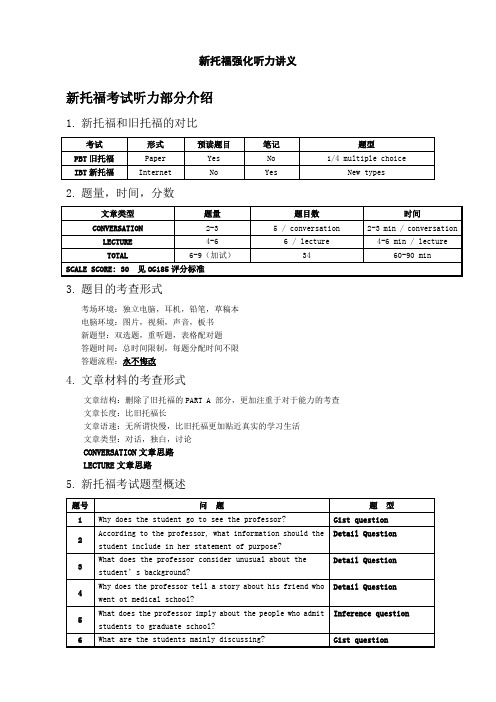
新托福强化听力讲义新托福考试听力部分介绍1.新托福和旧托福的对比考试形式预读题目笔记题型PBT旧托福Paper Yes No1/4 multiple choiceIBT新托福Internet No Yes New types2.题量,时间,分数文章类型题量题目数时间CONVERSATION2-3 5 / conversation2-3 min / conversation LECTURE4-6 6 / lecture4-6 min / lectureTOTAL6-9(加试)3460-90 min SCALE SCORE: 30 见OG185评分标准3.题目的考查形式考场环境:独立电脑,耳机,铅笔,草稿本电脑环境:图片,视频,声音,板书新题型:双选题,重听题,表格配对题答题时间:总时间限制,每题分配时间不限答题流程:永不悔改4.文章材料的考查形式文章结构:删除了旧托福的PART A 部分,更加注重于对于能力的考查文章长度:比旧托福长文章语速:无所谓快慢,比旧托福更加贴近真实的学习生活文章类型:对话,独白,讨论CONVERSATION文章思路LECTURE文章思路5.新托福考试题型概述题号问题题型1Why does the student go to see the professor?Gist question2According to the professor, what information should thestudent include in her statement of purpose?Detail Question3What does the professor consider unusual about thestudent’s background?Detail Question4Why does the professor tell a story about his friend whowent ot medical school?Detail Question5What does the professor imply about the people who admitstudents to graduate school?Inference question6What are the students mainly discussing?Gist questionGist question: 6Detail question: 16Purpose question: 6Attitude question: 1Organization question: 2Inference question: 3 6.界面展示7.IBT新托福资料说明——听力部分题目数量不多难度较简单题型全面,和考试相同,质量高精听精做题目分类研究文章精读研究不建议模考一共14套,其中新东方引进4套,还有2套是OG题目,其他全部为全真试题难度和考试相当,已经有较全的版本出现题型全面,场景全面精听精做建议最后冲刺模考题目数量大,后面有四套模拟试题前面的训练题目文章较短,不是托福模拟听力材料要比考试稍难些,速度也稍快些题型和考试相差很多,不建议细钻精听精做建议考前强化训练对语速跟读模仿题目数量大,有六套模拟试题具体特点同蓝皮delta 建议考前模拟对语速跟读模仿题目数量大,后面有7套模拟试题难度偏小,在基础班使用建议平时精听训练有四套模拟试题听力部分略难,语速略快配合模拟光盘,有临考感觉考前模考只有两套题,但质量很好,文章难度适中,题目难度和Barron相近,感觉上略难一些,和考试非常相似。
ibt listening 2汇总
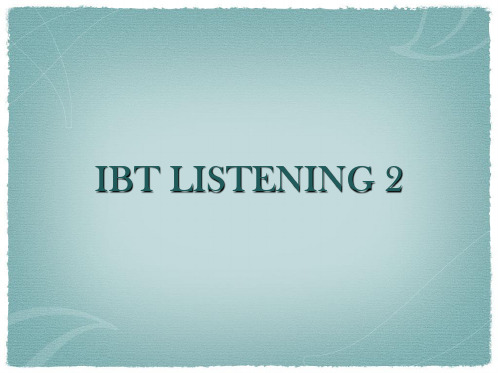
Internet- Based- TOEFL Listening
Part
Content
Question
Time
I
2(3)Conversations 5 Questions/ Conversation 5min/ conversation
I don’t want to get too far off topic here. / We’ve got a lot to get through today and only limited time. (防止跑 题)
Getting back to what I was saying. (重新回到话题)
IBT LISTENING 2
Notification
Please hand in your Writing Homework on before Oct. 10 No. 488252
Register online for Class 2015硕士英语(2)
What should we listen for?
The thing is, you are the expert on this issue. ( 鼓励学生 )
Smart Solution 2
正确答案的模式:关键词+具体内容
To draw her attention to a student grant To tell her that she got a student fellowship
Question Categories
1
Main Idea
2
• 考点:列举的特征、例子及原理
托福听力讲义_图文
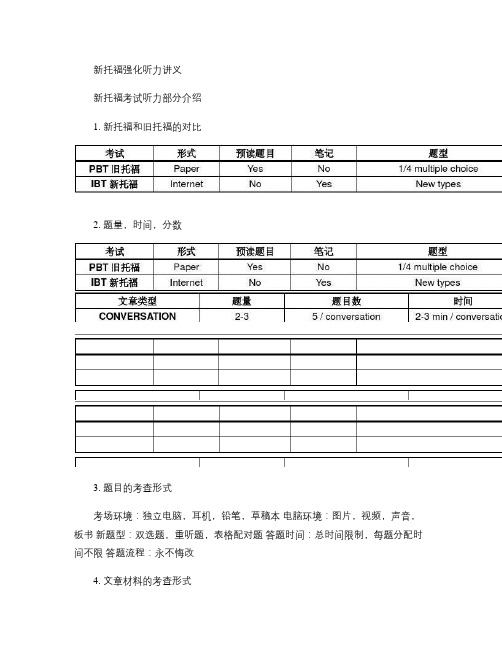
新托福强化听力讲义新托福考试听力部分介绍1. 新托福和旧托福的对比2. 题量,时间,分数3. 题目的考查形式考场环境:独立电脑,耳机,铅笔,草稿本电脑环境:图片,视频,声音,板书新题型:双选题,重听题,表格配对题答题时间:总时间限制,每题分配时间不限答题流程:永不悔改4. 文章材料的考查形式文章结构:删除了旧托福的PART A 部分,更加注重于对于能力的考查文章长度:比旧托福长文章语速:无所谓快慢,比旧托福更加贴近真实的学习生活文章类型:对话,独白,讨论 CONVERSATION 文章思路LECTURE 文章思路第1页5. 新托福考试题型概述第2页第3页6. 界面展示第4页7. IBT 新托福资料说明——听力部分第5页托福听力中的九大语音问题1. 语速问题托福听力过程中的语速问题如何解决语速问题2. 连读问题托福听力过程中的连读问题(1)关键性词语出现连读:否定形式● not at all:The meeting yesterday wasn’t at all boring.(2)常用性词语出现连读● for him连读中的基本规则(1)辅音+元音连读● I was found on the ground by the fountain about a field of a summer stride. ● Not at all. ● Rush hour.● This dictionary is not exactly what I wanted but it will do. ● Travel agency, travel agent(2)辅音+辅音连读● So me money, bike key(3)元音+元音连读● Be on time(4) H 连读● I lent him a book.● Larry is taking a lot of art, isn’t he?● The stuff the nurse gave me seemed to have helped.● I must have left my keys at my sister’s house. ● She learned to use the computer on her own.(5)其他特殊连读● 【t 】+【j 】=【ch 】:meet you, hurt you, that your ● 【d 】+【j 】=【dg 】:would you, hand your, did you ● 【s 】+【j 】=【sh 】:miss you, this year ● 【z 】+【j 】=【g 】:as usual, because you● Example: won ’t you, don ’t you, didn ’t you, haven ’t you, hadn ’t you, wouldn ’t you,weren ’t you, last year, next year, not yet, did you, had you, would you, I advice you, I use your, how’s your如何解决连读问题3. 失爆问题托福听力过程中的失爆问题:【p 】,【b 】,【t 】,【d 】,【k 】,【g 】任意两个连续出现就会发生失爆现象● Sit down, good night, friendly ● -this ca lculator isn’t working right.-I think you’ve got the battery in upside down.如何解决失爆问题4. 略读问题托福听力过程中的略读问题:书写时将两个或多个相邻的单词省略某些字母而连接起来● I am = I’m, you have = you’ve, how is = how’s, that would = that’d ● Doesn ’t, didn’t, shouldn’t, hadn’t, hasn’t, wouldn’t, won’t● Official guide P199:OK. So we’ve talked about some different types of root systems of plants,and I’ve shown you some pretty cool slides, but now I want to talk about the extent of the rot system- the overall size of the root system…the depth.如何解决略读问题● I’m, you’re, she’s, they’re, there’s, he’s, who’s● We ’ve, he’ll, she’d, she’ll, she’s, they’d, they’ve, they’ll ● Can ’t, weren’t, won’t, aren’t, wouldn’t, shouldn’t ● Gotta, gonna5. 弱读问题托福听力过程中的弱读问题(1)介词弱化:● stay at home, do it for fun, come from China, go in the house, a cup of coffee, the train toParis(2)代词弱化:● Phone us when you are free. ● I’ve lost my book.(3)连词弱化:● Please give me some cream and sugar. ● Either Tom or Peter can come.如何解决弱读问题6. 英美音差异问题托福听力过程中的英美音问题(1)【r 】音问题● Idea, really● They weren’t at the dorm last night.(A They went to the dormitory. (B They didn’t go to the dormitory.● -The snow is really coming down, isn’t it?-Rarely do we have so much snow in December. -What does the man mean?(A it is typical December weather for this region.(B such a large amount of snow is unusual for this month.(2)【o 】【a:】● Glass, class, fast ● Hot, box, rock(3)其他情况● Neither如何解决英美音问题● 常见易混音:Course-cause, once more-one small, career-Korea, worse-was, bore-ball,door-doll, core-call, tear-tea, short-shot● 不加儿化音的词:China, Australia, banana, wall● 常见英美音不同读法:Neither, either, record, cupboard, cassette, garage, laboratory, adult,ordinarity, secretary, dictionary7. 词性变音问题托福听力过程中的词性变音问题● Method- methodically● 校园词汇的变音:meterology, economics, geography 如何解决词性变音问题● Company-companion, library-librarian, geography-geographical, ignore-ignorant,photo-photographer-photographic, declare-declaration, economy-economic-economical, invite-invitation, technology-technological, type-typical, wild-wildness8. 缩写问题托福听力过程中的缩写问题● Sitcom ● Chem lab ● prof如何解决词性缩写问题● Intro. Course = introductory course 导论性课 Demo = demonstration 演示Memo =memorandum 备忘录Info. = Information 信息 Expo = exposition 博览会Chem.= chemistry 化学 Comm. = commerce 商业 Tech = technology 技术 Ad.= advertisement 广告Dorm = dormitory 寝室 M.A. = Master of Arts 文学硕士 M.S. = Master of Science 理学硕士 B.A. =Bachelor of Arts文学士 B.S. = Bachelor of Science理学士alga = algebra 代数学、代数 anat = anatomy 解剖学、解剖 archit = architecture 建筑学、建筑 arith = arithmetic 算术、算术 astron= astronomy 天文学、天文eng = engineering工程学、工程 electr = electricity电学、电 fin = finance 财政学、财政 geol = geology 地质学、地质 geom = geometry 几何学、几何 gram = grammar 文法 hist = history历史、史 ling = linguistics语言学、语言 maths = mathematics数学、数学 mech = mechanics 机械学、机械 med = medical医学、医 met = meteorology气象学、气象 myth = mythology 神话 phil = philosophy哲学 phon = phonetics 语言学、语言 photo = photography摄影术、摄影phys = physics物理学、物理 physiol = physiology生理学、生理 pol = politics政治学、政治 psych = psychology心理学、心理9. 数字问题托福听力过程中的数字问题● 逗号原则● 1,234,567,890:● =: equal to, the same as ● ≠: difference● ↑: increase, promote, enhance, improve ● ↓: decrease, fall, worsen● +: plus, add, besides, moreover ● -: minus, deduct, except ● →: result in, lead to● ←: originate from, date back to● √: correct, good, positive, affirmative ● ×: wrong, bad, mistaken, negative ● ☆: outstanding, elite● ∵: because, owing to, thanks to, since, as● ∴: therefore, consequently, as a result, so, hence ● ∑: total, amount ● γ: government 缩写● able BL: PRB L, RSBL ,DBL ● ing G: SHPG ● tion N: OPTN,NAN ● ment T: AGRMT ● ize Z: RCGNZ,OGNZ ● tive TV: EFCTV,● ful FL: SCFL ● less LS: RGDLS ● ent/ant T: URGT ● al/ial L: ARVL练习Sample Script:American universities have been offering classes online through computers for a number of years. Now, some newly created colleges are offering academic degrees online. One university offers both bachelor’s degrees and master’s degrees. Official say they try to provide students with a social experience as well as an educational one. For example, in some programs, groups of the same six students progress through all their classes together. They communicate by computer. Another online school uses a problem-solving method of teaching. Students attempt to solve real problems in their classes online instead of reading information.Students who have taken online classes say they like them because they do not have to travel to building at a set time to listen to a professor. Professors say they have better communication with students through e-mail notes than they do in many traditional classes.新托福听力文章套路1. 托福听力中的重点原则原则一:大写原则原则二:开头结尾原则:3T-2M 原则原则三:重复原则原则四:转折对比原则原则五:强调原则原则六:比较原则原则七:建议原则原则八:举例原则原则九:现在原则原则十:解释原则原则十一:因果原则原则十二:观点态度原则原则十三:特殊问句原则2. 举例:OFFICIAL GUIDE PRACTICE SET 1——CONVERSATION3. 举例:OFFICIAL GUIDE PRACTICE SET 2——LECTURE1. 课程相关事务场景场景特点:主要涉及到一些和课程相关事项的解决方法。
托福听力(2)
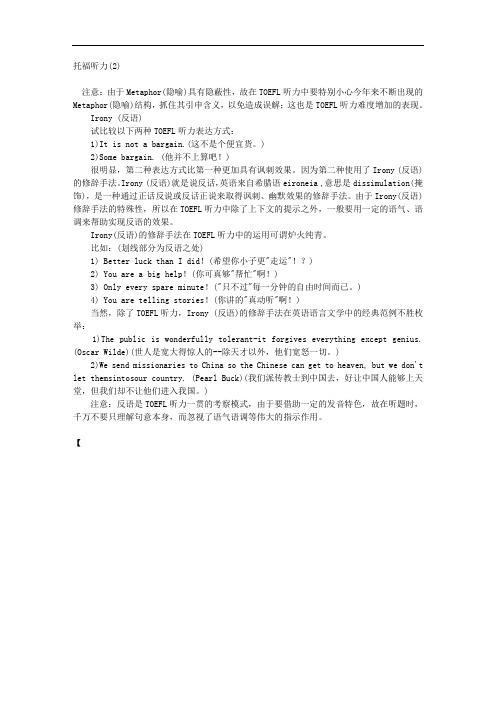
托福听力(2)注意:由于Metaphor(隐喻)具有隐蔽性,故在TOEFL听力中要特别小心今年来不断出现的Metaphor(隐喻)结构,抓住其引申含义,以免造成误解;这也是TOEFL听力难度增加的表现。
Irony (反语)试比较以下两种TOEFL听力表达方式:1)It is not a bargain.(这不是个便宜货。
)2)Some bargain. (他并不上算吧!)很明显,第二种表达方式比第一种更加具有讽刺效果。
因为第二种使用了Irony (反语)的修辞手法。
Irony (反语)就是说反话,英语来自希腊语eironeia ,意思是dissimulation(掩饰),是一种通过正话反说或反话正说来取得讽刺、幽默效果的修辞手法。
由于Irony(反语)修辞手法的特殊性,所以在TOEFL听力中除了上下文的提示之外,一般要用一定的语气、语调来帮助实现反语的效果。
Irony(反语)的修辞手法在TOEFL听力中的运用可谓炉火纯青。
比如:(划线部分为反语之处)1) Better luck than I did!(希望你小子更"走运"!?)2) You are a big help!(你可真够"帮忙"啊!)3) Only every spare minute!("只不过"每一分钟的自由时间而已。
)4) You are telling stories!(你讲的"真动听"啊!)当然,除了TOEFL听力,Irony (反语)的修辞手法在英语语言文学中的经典范例不胜枚举:1)The public is wonderfully tolerant-it forgives everything except genius. (Oscar Wilde)(世人是宽大得惊人的--除天才以外,他们宽怒一切。
)2)We send missionaries to China so the Chinese can get to heaven, but we don't let themsintosour country. (Pearl Buck)(我们派传教士到中国去,好让中国人能够上天堂,但我们却不让他们进入我国。
- 1、下载文档前请自行甄别文档内容的完整性,平台不提供额外的编辑、内容补充、找答案等附加服务。
- 2、"仅部分预览"的文档,不可在线预览部分如存在完整性等问题,可反馈申请退款(可完整预览的文档不适用该条件!)。
- 3、如文档侵犯您的权益,请联系客服反馈,我们会尽快为您处理(人工客服工作时间:9:00-18:30)。
3大类别8大题型
Basic Comprehension Questions 基本理解型题 • 1. Gist-Content—内容主旨题 • 2. Gist-Purpose—目的主旨题 • 3. Detail—细节题 • Pragmatic Understanding Questions情景理解型题(实际意义上的理 解) • 4. Understanding the Function of What Is Said—句子功能题 • 5. Understanding the Speaker’s Attitude—说话人态度题 • • • • Connecting Information Questions—整合信息型题 6. Understanding Organization—组织结构题 7. Connecting Content—连接内容题 8. Making Inferences—推论题
3. Detail—细节题
• 考查细节把握能力,讲座、对话都有。
• 典型的举例,说明,定义,以及解释性语言要多注意。
• 与内容主旨相关联的信息,不论是直接关联还是间接的 都会考。 • 缺德题:考与主旨内容不相关的细节!有30%几的机率 考!
典型问法
• What does the woman suggest the man do? • What help did the young man receive? Click on two answers. • What is …? • What resulted from the invention of the …? • According to the instructor, what characteristic should ….... have? • According to the speaker, what does ……… mean? • According to the professor, why is A superior to B? • According to the professor, what is one way that A can affect B? • According to the professor, what is the main problem with the … theory? • Select the diagram that represents ………?
2. Gist-Purpose—目的主旨题
• 考查目的,多出现在对话题中 • 材料内容对目的判断的干扰性大,要主抓真实目的, 不要被迷惑 • 围绕解决问题出现的,一定要抓住问题及其解决方案
典型问法:为什么呢?
• Why did the man/woman go to see the professor? • Why did the professor ask to see the student? • Why does the student visit the professor? • Why does the student visit the registrar’s office? • Why does the professor explain ……? • Why does the student say ……? • Why does the student mention ……? • Why does the professor talk about ……? • Why does the instructor ask the class about ……?
Basic Comprehension Questions 基本理解型题
• rpose—目的主旨题
• 3. Detail—细节题
1. Gist-Content—内容主旨题
• 明确主旨,主抓大意。讲座和对话都有。
• 材料中明确提出—lucky
谢谢!
• 需要概括总结—实力体现
典型问法:说啥呢?
• What is the subject of the conversation? • What are the man and the woman discussing? • What is the professor mainly discussing? • What are the speakers mainly discussing? • What aspect of …… does the instructor mainly discuss? • What is the lecture mainly about? • What is the main topic of the lecture? • What is the woman’s problem? • What problem does the man have?
